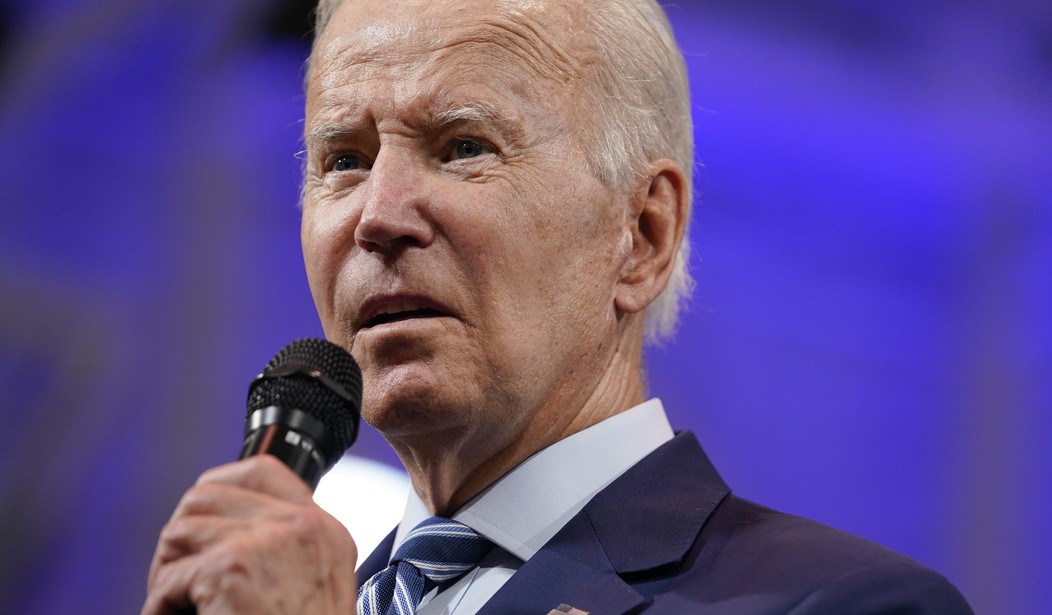WASHINGTON, DC – It usually takes about a year or a year and a half for new economic policies to take effect, so the pain we are now feeling is the result of the Democratic Party’s policies.
Grocery prices are up 13 percent from a year ago. Energy prices are up almost 20 percent. Mortgage rates are at a 20-year high, with house payments up 50 percent. Real incomes are falling. Your life savings? The average 401(k) has fallen by 25 percent. The economy shrank in the last quarter and in the quarter before that, and economists predict it will shrink in the next quarter and the one after that.
“Our economy is strong as hell,” Joe Biden said Saturday.
If we had simply continued the Trump energy policies, with the effects of the Wuhan coronavirus now receding, we would be experiencing an unprecedented economic boom. Instead, everything is collapsing. In a CBS News/YouGov survey released October 16, 65 percent of voters said the economy is getting worse. And many voters know whom to blame: Have Democrats’ policies helped the economy or harmed the economy? “Helped,” 29 percent. “Harmed,” 48 percent.
With the election close upon us, and early voting already underway in some places, voters appear to be moving in favor of Republicans. It’s not just because it was mostly Democrats who, with their policies, got us in this mess. It’s also because Democrats seem to be the most out of touch with voters’ real concerns.
Last October, former Obama administration Economic Council Chairman Jason Furman tweeted that “the economic problems we're facing (inflation, supply chains, …) are high class problems.”
Recommended
Astonishingly, Biden Chief of Staff Ron Klain retweeted Furman’s let-them-eat-cake message with two energetic pointing-finger emojis for emphasis and the caption “This.”
In December, CNN headlined a story: “Why inflation can actually be good for everyday Americans and bad for rich people.”
In fact, rich people have many ways of coping with inflation and a stagnant economy, at least, in comparison to the limited options working people, small business owners, and the retired face. That’s why a bad economy hurts regular people more than the wealthy. In times past, Democrats understood the plight of regular people. Not anymore, it seems.
Everyone remembers Hillary Clinton’s claim in 2016, before a wealthy audience at a fundraiser with Barbra Streisand, that half of Trump’s supporters were “deplorables.” What people may not remember is that Clinton followed up with a similar comment about a year and a half later.
During a talk in Mumbai in March 2018, Clinton said, “If you look at the map of the United States, there's all that red in the middle where Trump won. Now I win the coasts. I win, you know, Illinois and Minnesota — places like that, but what the map doesn't show you is that I won the places that represent two-thirds of America's Gross Domestic Product. So, I won the places that are optimistic, diverse, dynamic, moving forward.”
At the time, even left-wing writer Aaron Blake of The Washington Post couldn’t accept what Clinton said. “It's difficult not to read Clinton's comments as an argument that her votes were more valuable — or at least more productive — than were Trump’s,” Blake wrote. “Why bring up gross domestic product? Some have suggested Clinton was saying wealthy people's votes should have counted for more.”
As the Democratic Party becomes increasingly a party of the affluent, it loses touch with the regular people who were once the party’s base. And once the base collapses, a political party can fall pretty quickly.
That’s because members of a political party tend to congregate within certain groups – religious groups and ethnic groups that congregate in local neighborhoods and towns, for example. That’s why political analysts speak of the “Catholic vote” in Boston or the “black vote” in Washington. Most people base their political decisions mostly on how their friends, neighbors, family members, and coworkers vote, rather than on a carefully reasoned look at the pros and cons of various positions. It’s just human nature. And the same principle applies to people in certain jobs and certain economic sectors.
Thus, we see this kind of pattern: SameGrain, a social network app, asked its users whom they were voting for in the 2016 U.S. presidential election and compared their choice to their professions, noting that “Clinton voters are more than three times more likely to be teachers and more than four times less likely to be in law enforcement than Trump’s voters. All Republican candidates have a relatively high percentage of voters in law enforcement, the military, and public safety, while the Democratic candidates enjoy higher support from those in non-profits, government, and entertainment professions.” Trump was dominant among those in the construction business.
In a recent study, most locksmiths, plumbers, pawnbrokers, nurserymen, and anesthesiologists were Republicans, while there were very few Republican choreographers, costume designers, yoga instructors, and English professors. Hotel managers and professional golfers were mostly Republican; innkeepers and professional poker players were mostly Democrats.
If you’re a typical voter, your place in the world, more than your political philosophy, is the foundation for your politics.
Democrats, by disrupting the economy and changing the basic life circumstances of tens of millions of people, are changing the way those people identify politically.
You might say that Democrats love the poor so much that they made a lot of them. Democrats’ problem is that the newly poor may not love them back.

























Join the conversation as a VIP Member